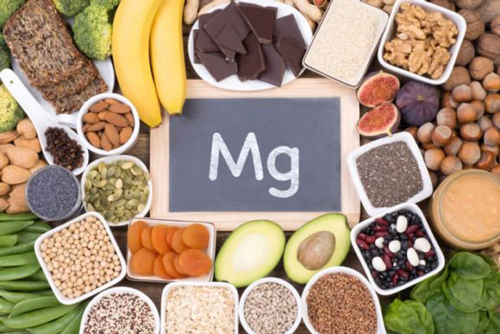How magnesium protects against heart disease, stroke and diabetes (most of us are deficient)
We’ve covered this topic before, but the importance of magnesium can’t really be stressed enough. Do you know how essential magnesium is to your health? Many of the symptoms we experience in our daily lives could be solved simply by eating magnesium-rich foods or through magnesium supplementation.

A recent study conducted by Zhejiang University and Zhengzhou University in China examined over 1 million people across nine countries, and found that those who consumed the most dietary magnesium had a 10% lower risk of coronary heart disease (one of the leading causes of death in the United States), a 12% lower risk of stroke, and a 26% lower risk of developing type 2 diabetes. This research was published in Biomed Central.
According to study lead author Dr. Fudi Wang:
“Low levels of magnesium in the body have been associated with a range of diseases, but no conclusive evidence has been put forward on the link between dietary magnesium and health risks. Our meta-analysis provides the most up-to date evidence supporting a link between the role of magnesium in food and reducing the risk of disease. Our findings will be important for informing the public and policy makers on dietary guidelines to reduce magnesium deficiency-related diseases.”
Wang also notes that, while current guidelines recommend men take about 300 mg of magnesium daily and women 270 mg, magnesium deficiency remains common, affecting between 2.5% and 15% of the population.
Just How Much Should We Be Looking at Magnesium?
Medical and naturopathic doctor Carolyn Dean, a member of the Nutritional Magnesium Medical Advisory Board, claims that it’s obvious cholesterol isn’t the cause of heart disease, as doctors have been prescribing statins for two decades to solve this problem, yet heart disease continues to be the number one killer in America.
Other medical conditions that can be attributed to magnesium deficiency include hypertension (high blood pressure), heart arrhythmia, angina, heart attack, and high cholesterol. Most of these ailments are directly related to the heart, so it seems that magnesium is essential for heart health. Given how few people get enough magnesium each day, this information could very well save lives.
How to Ensure Adequate Magnesium Levels
The World Health Organization (WHO) recommends intaking 400 to 500 mg of calcium each day, and suggests taking it alongside magnesium for a 1 to 1 balance. Consuming calcium through your diet with vitamin D and Vitamin K2 “combined will protect your heart,” too.
Wang and his team also analyzed data from 40 epidemiological studies from 1999 to 2016, examining the associations between dietary magnesium and various diseases. All the studies used food frequency questionnaires in order to determine participants’ magnesium intake.

Being an observational study, they could not determine whether biological or other lifestyle factors affected their results, but the sheer size of the study still suggests a direct link between dietary magnesium intake and health.
As noted in Wang’s press release, “Magnesium is vital for human health and normal biological functions including glucose metabolism, protein production and synthesis of nucleic acids such as DNA. Diet is the main source of magnesium as the element can be found in foods such as spices, nuts, beans, cocoa, whole grains and green leafy vegetables.”
How Can You Naturally Combat Heart Disease?
Required for more than 300 biochemical reactions in the body, magnesium does a lot to keep us healthy. It keeps your bones strong, supports your immune system, maintains normal nerve and muscle function, and helps regulate blood glucose levels, in addition to its benefits to the heart. It’s also essential for maintaining energy levels as well, so if you are tired all the time, the solution could be quite simple: eat more magnesium. Thankfully, magnesium is available in many different foods and is relatively easy to find — you just have to make sure you are getting enough! Green, leafy vegetables are your best bet, but there are plenty of other sources.
Here are the top 10 magnesium-rich foods, courtesy of Dr. Axe:
(Men RDA 400 milligrams and Women RDA 310 milligrams a day)
Spinach — 1 cup: 157 milligrams (40% DV);
Chard — 1 cup: 154 milligrams (38% DV);
Pumpkin seeds — 1/8 cup: 92 milligrams (23% DV);
Yogurt or Kefir — 1 cup: 50 milligrams (13% DV);
Almonds — 1 ounce: 80 milligrams (20% DV);
Black Beans — 1/2 cup: 60 milligrams (15% DV);
Avocado — 1 medium: 58 milligrams (15% DV);
Figs — 1/2 cup: 50 milligrams (13% DV);
Dark Chocolate — 1 square: 95 milligrams (24% DV);
Banana — 1 medium: 32 milligrams (8% DV).
Essentially, if you are eating a plant based diet, with a whole bunch of leafy greens, you should be fine. The issue is that many of us are not. This is why it is so important to eat your vegetables. They contain so many of the vitamins and minerals that keep our bodies and minds running optimally.
A few other foods that are rich in magnesium include sunflower, hemp, and fennel seeds, cashews, brazil nuts, chives, coriander, cumin, parsley, basil, and cloves.
For example, add three tablespoons of hemp seeds to your morning smoothie every day, and that alone gives you 70% of the recommended daily intake for magnesium. Getting enough magnesium isn’t difficult — it just requires a bit of planning.
yogaesoteric
March 31, 2019
